Erstellt am: 18. 12. 2015 - 11:23 Uhr
Paris: Living Well Is The Best Revenge
Heavily armed police in flak jackets stood on the mount in front of the grey-white basilica of Sacré-Coeur, looking down over a the flat sprawl of the city below.
Behind the basilica soldiers in tan and green camouflage, cradling fearsome looking automatic weapons, walked three abreast down the cobbled and crooked streets where the touts peddled caricature portraits, rehashed copies of Van Gogh or Monet or little trinkets and key-rings of the Eiffel Tower to the sparse crowds of tourists.
State of Emergency
This is Paris, one month into France’s state of emergency – and the visitors are still coming, but, at the moment, in dwindling numbers.
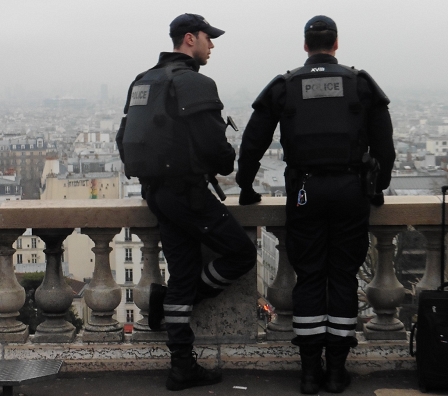
Chris Cummins
"Life hasn’t really changed", says Jeffrey who is sweeping in front of the restaurant he runs near the Place du Tertre. "It’s true it is quite quiet, but this is always a quiet season and this week has been much better than the past few. I think normality is returning." Hotels in Paris have reported losses since the attacks and the usually thronging Christmas markets, now patrolled by armed servicemen, are decidedly quiet.
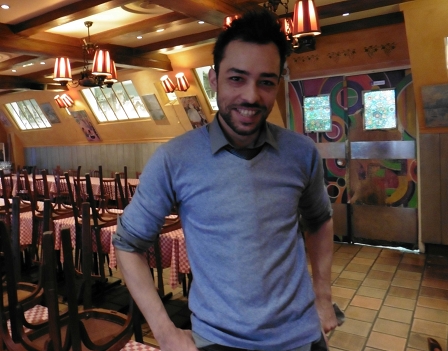
Chris Cummins
Jeffry and I talked about the soldiers – their appearance that I found unnerving. "It is good to see the soldiers and the police," he told me but the government has a lot more work to do to bring security to Paris. "For me November 13th didn’t really change anything. There were terrorists before then."
There have been more subtle changes in everyday life though, Joel, an architect who who works just below the Moulin de la Galette told me. He described it in a delightfully French way: via eating habits. Apparently the "deuxième service" – the late reservation at restaurants - is suffering as people prefer to eat early – for the "première service" - and then go home early.
"We are used to doing what we want"
There are other changes too. "We are used to doing what we want," Joel said, "but now we find ourselves paying more attention to what we are doing and also, to be honest, what are neighbours are doing."
Dieses Element ist nicht mehr verfügbar
But at night, especially in the student quarters around Le Pantheon and in the cosy, cheap restaurants on the Left Bank the café restaurants are full, rumbling with heavily gesticulated conversation and ringing with laughter. Even La Bonne Bière, the site of one of the attacks, has opened its doors again.
This is not a city that is cowering; Paris, for the visitor, is as intoxicating as ever.
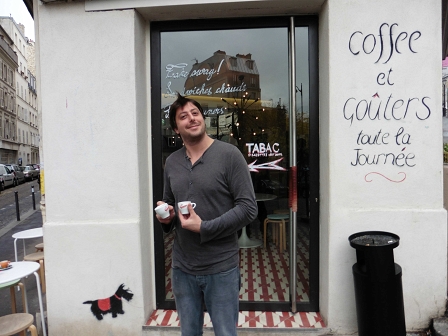
Chris Cummins
“In a way nothing has changed,” said Jules, a café owner: “We are French and we love the sort of life we have always had so we will fight for that. They can’t break that.” But he added that if the spirit can’t be defeated, the economic strain of tourists keeping away and locals staying at home is beginning to be felt.
The French government estimates that the tourism and hospitality industries will lose around 2 billion euros as a result of the anxiety and fear that have spread in the wake of the terror attacks.
"You can love a city "
For me, it was moving to be back in Paris so soon after the trauma of Friday the 13th of November, in which 130 people were killed in jihadist attacks. I’d scrapped together and presented our Reality Check special the next morning, trying to keep that journalistic clarity while feel sick to the pit of my stomach.
There was an internet backlash to the public shock and mourning, as though it was suggesting that a life lost in Paris was somehow worth more than a life lost barely 24 hours before in Beirut – appalling attacks we also covered in Reality Check. No victim of terror counts more or less than any other victim. We all know that intellectually.
But attacks in places you know do have a more raw emotional impact – that’s not a rational judgment of worth but a feeling of loss. You can love a city you have lived in; not cold brick and mortar of buildings but its spirit and the effect it has had on you. And when that spirit is under attack it feels almost personal.
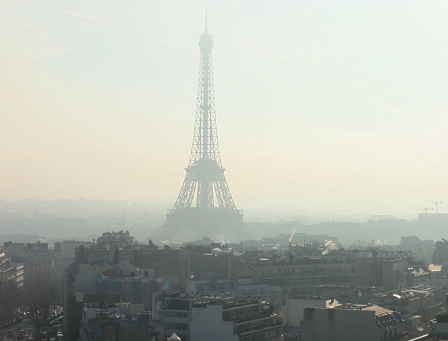
Chris Cummins
I spent just a few months in Paris as a 20-year old, in love, for the first time, with a girl and a city where everything seemed possible. I worked tables and poured drinks to pay the nominal rent for a room near the Gare de Nord, a filthy cramped room with a hole in the outside wall that let in the sounds and smells of the street. We rented it in cash for a nominal price from a Persian landowner whose son sat through the nights in the kitchen plucking ineffectually on an acoustic guitar.
Post-World Cup Glow of Optimism
It was a great time to be in France (and I’ll give away my age here) with a multi-racial, multi-cultural French rainbow team having just won the 1998 World Cup. I chopped vegetables in kitchens with relatively newly arrived migrants who wore their replica Zidane shirts with pride.
I took any job that came my way, waiting in line at 5am to get a day’s work dismantling a circus in the Jardin de Tuileries, alongside an Algerian called Djamel who became a friend and whose intoxicating descriptions of his home town almost persuaded me to visit his family in Oran at the height of the Algerian troubles.
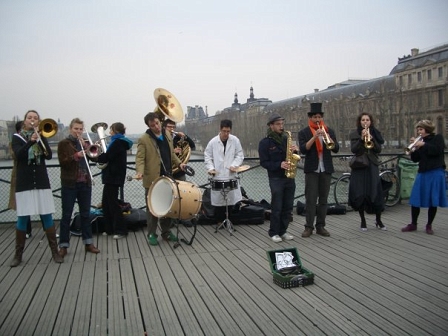
Chris Cummins
At night we took ready-mixed plastic packages of cold couscous and the cheapest wine we could find and sat on the steps that lead up to the Montmartre. The millennium night came and went, with a scrum on the Champs d’Elysee and fireworks screaming from every wrung of the Eiffel Tower. Days like that stay with you for a lifetime.
So Paris feels like an old friend for me and that night of the 13th, as I watched in horror as the scale of the attacks became clear, I wondered how badly my old friend would be wounded. And if there ever had been a multi-cultural, multi-racial dream, was it about to be dashed in the seemingly inevitable anti-immigration backlash.
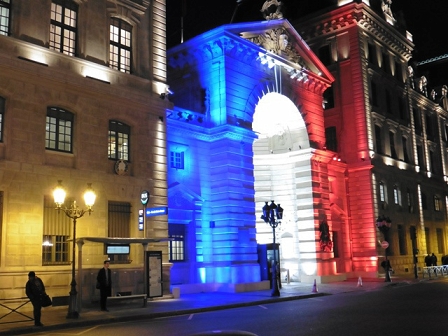
Chris Cummins
The first difference you notice is that many public buildings across the city now have spot-lit in the colours of the tricolour red white and blue. Many people have hung tricolours out of Windows: they see it symbol of defiance against the terrorists: an affirmation of French values. As a young Parisian called Stefan answered succinctly when I asked for his feelings on how the city had changed "Vive La France! Vive La Republique! Vive La Liberté!"
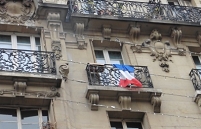
Chris Cummins
Some Parisians I spoke to were fairly ambivalent about the ubiquity of the Tricolore. A flag can mean been many things including, sometimes nationalism in its most excluding form, and the far right did have a brief surge in the first round French regional elections (gaining 28% of the vote) following the attacks before flopping in the second round. But for Jukes it is about inclusivity a whole mixed society rallying behind a symbol of unity:
“I think it is a gesture of solidarity. I think it has nothing to do with the Front National. It is about being together”
I think there is a sense of togetherness. Personally, I don’t buy into the stereotype of Paris being unfriendly – I’ve always been treated to smiles and small kindnesses from strangers here and what’s not to like about the shrugging nonchalance of an elderly waiter? But perhaps there is some truth in the rumours of Parisians becoming more attentive over the past 5 weeks.
Lisa Anselmo wrote in The Local “There is a sense of communion among Parisians that only a shared tragedy can bring, something positive in the wake of pain”. Was I imagining it or was there an extra grace in the way Parisians smilingly made space in the metro trains? The nodding welcome from the men sipping quick espressos at zinc bars. Or was this grace always there and unnoticed?
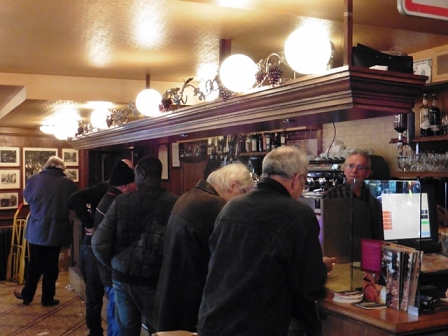
Chris Cummins
There was a moment on this trip when two teenagers with braided hair were rummaging through their packed lunches looking for things to give a young woman from Afghanistan who was begging on the train that passes between the Stade de France and the Gare de Nord – the part of Paris Hemingway once called “the saddest and dirtiest part of town.”
The girls were giggling at what else they might find in the deep recesses of their bags – some wrapped up cheese, a can of coke, some coins. What else might she like? The young beggar was laughing at the girls’ efforts and the men on the seats opposite were smirking at the scene. It was a beautiful moment. It made my day.
This town will be alright, I thought. There’ll be tough months to come; maybe years. But my old friend will be alright.


